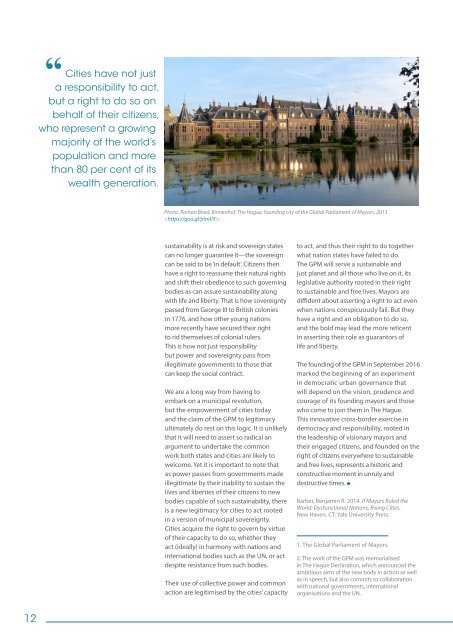A new urban paradigm pathways to sustainable development
PiF37
PiF37
You also want an ePaper? Increase the reach of your titles
YUMPU automatically turns print PDFs into web optimized ePapers that Google loves.
“<br />
Cities have not just<br />
a responsibility <strong>to</strong> act,<br />
but a right <strong>to</strong> do so on<br />
behalf of their citizens,<br />
who represent a growing<br />
majority of the world’s<br />
population and more<br />
than 80 per cent of its<br />
wealth generation.<br />
Pho<strong>to</strong>: Roman Boed. Binnenhof, The Hague, founding city of the Global Parliament of Mayors, 2013<br />
.<br />
sustainability is at risk and sovereign states<br />
can no longer guarantee it—the sovereign<br />
can be said <strong>to</strong> be ‘in default’. Citizens then<br />
have a right <strong>to</strong> reassume their natural rights<br />
and shift their obedience <strong>to</strong> such governing<br />
bodies as can assure sustainability along<br />
with life and liberty. That is how sovereignty<br />
passed from George III <strong>to</strong> British colonies<br />
in 1776, and how other young nations<br />
more recently have secured their right<br />
<strong>to</strong> rid themselves of colonial rulers.<br />
This is how not just responsibility<br />
but power and sovereignty pass from<br />
illegitimate governments <strong>to</strong> those that<br />
can keep the social contract.<br />
We are a long way from having <strong>to</strong><br />
embark on a municipal revolution,<br />
but the empowerment of cities <strong>to</strong>day<br />
and the claim of the GPM <strong>to</strong> legitimacy<br />
ultimately do rest on this logic. It is unlikely<br />
that it will need <strong>to</strong> assert so radical an<br />
argument <strong>to</strong> undertake the common<br />
work both states and cities are likely <strong>to</strong><br />
welcome. Yet it is important <strong>to</strong> note that<br />
as power passes from governments made<br />
illegitimate by their inability <strong>to</strong> sustain the<br />
lives and liberties of their citizens <strong>to</strong> <strong>new</strong><br />
bodies capable of such sustainability, there<br />
is a <strong>new</strong> legitimacy for cities <strong>to</strong> act rooted<br />
in a version of municipal sovereignty.<br />
Cities acquire the right <strong>to</strong> govern by virtue<br />
of their capacity <strong>to</strong> do so, whether they<br />
act (ideally) in harmony with nations and<br />
international bodies such as the UN, or act<br />
despite resistance from such bodies.<br />
Their use of collective power and common<br />
action are legitimised by the cities’ capacity<br />
<strong>to</strong> act, and thus their right <strong>to</strong> do <strong>to</strong>gether<br />
what nation states have failed <strong>to</strong> do.<br />
The GPM will serve a <strong>sustainable</strong> and<br />
just planet and all those who live on it, its<br />
legislative authority rooted in their right<br />
<strong>to</strong> <strong>sustainable</strong> and free lives. Mayors are<br />
diffident about asserting a right <strong>to</strong> act even<br />
when nations conspicuously fail. But they<br />
have a right and an obligation <strong>to</strong> do so,<br />
and the bold may lead the more reticent<br />
in asserting their role as guaran<strong>to</strong>rs of<br />
life and liberty.<br />
The founding of the GPM in September 2016<br />
marked the beginning of an experiment<br />
in democratic <strong>urban</strong> governance that<br />
will depend on the vision, prudence and<br />
courage of its founding mayors and those<br />
who come <strong>to</strong> join them in The Hague.<br />
This innovative cross-border exercise in<br />
democracy and responsibility, rooted in<br />
the leadership of visionary mayors and<br />
their engaged citizens, and founded on the<br />
right of citizens everywhere <strong>to</strong> <strong>sustainable</strong><br />
and free lives, represents a his<strong>to</strong>ric and<br />
constructive moment in unruly and<br />
destructive times.<br />
Barber, Benjamin R. 2014. If Mayors Ruled the<br />
World: Dysfunctional Nations, Rising Cities.<br />
New Haven, CT: Yale University Press.<br />
1. The Global Parliament of Mayors.<br />
2. The work of the GPM was memorialised<br />
in The Hague Declaration, which announced the<br />
ambitious aims of the <strong>new</strong> body in action as well<br />
as in speech, but also commits <strong>to</strong> collaboration<br />
with national governments, international<br />
organisations and the UN.<br />
12


